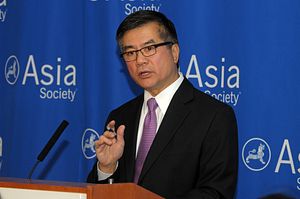When Gary Locke was nominated to be the U.S. ambassador to China, many Chinese were overjoyed, because Locke is a Chinese-American. Viewed as “one of us,” he was expected to have a better understanding of the concerns and interests of his ancestral country, and hence to play a more positive role in the bilateral relationship.
Yet from the day of his arrival in Beijing in August 2011 until his departure in early 2014, Locke apparently never really felt “at home” among his Chinese compatriots. The image of a humble and frugal American official — at ministerial rank by Chinese standards — who bought his own Starbucks coffee and carried his own luggage at airports, throws into sharp relief the privileged — and usually corrupt — lifestyle of many Chinese officials. Locke not only made PM2.5 a household word in China, but also had the misfortune of getting intimately — though unexpectedly — involved in Chinese domestic politics, when first the former police chief of Chongqing and then a blind lawyer named Chen Guangcheng sought political asylum from the United States.
Just two days before Locke’s departure, the state-run China News Service published an opinion piece entitled “Farewell, Gary Locke.” The author was undoubtedly inspired by one of Mao Zedong’s most famous works, “Farewell, Leighton Stewart,” which was a damning criticism of U.S. China policy during the Chinese civil war in the 1940s. In the article, Gary Locke was conveniently referred to as a “banana,” that is, white/American inside but yellow/Chinese outside. “But the skin of a banana will eventually rot, exposing the white inside, which will also rot and turn dark,” wrote the author, extending the metaphor. The article contends that Locke’s humble lifestyle as reported by the Chinese media was deliberately staged to embarrass Chinese officials and to incite discontent among the ordinary Chinese. “Unable to read his ancestral country’s language and ignorant about Chinese laws,” the author claimed, “Mr. Locke is nevertheless particularly fond of messing up with Chinese domestic politics.” The closing line of the article reads: “Goodbye smog, goodbye evil spirit. Farewell, Gary Locke.”
This opinion piece certainly doesn’t represent the views of the average Chinese, but it is nevertheless an illuminating case through which one can get a good sense of Chinese perceptions of Chineseness. Born, raised, and educated in the United States, Gary Locke is by all means an American. But just because his grandfather was a Chinese, Locke is also viewed as a Chinese, though he can utter only a few simple Chinese words and can hardly read the written language. By contrast, his predecessor, Jon Huntsman, is fluent in Chinese and even has an adopted Chinese daughter. The irony is that Huntsman was hailed as one of the best U.S. ambassadors to China because he displayed more “Chineseness” than the Chinese people would expect of an American, while Locke ended up being viewed as an “evil spirit” because he apparently had much less “Chineseness” save for his Chinese face.
Back in 1782, John Crevecoeur, a French immigrant who was naturalized in New York, published his classic Letters from an American Farmer. “What then is the American, this new man?” he asked. His answer was that “individuals of all nations are melted into a new race of men,” hence the melting pot metaphor for the United States.
What does it mean to be a Chinese then? This is a soul-searching question for both the Chinese government and the Chinese people, especially at a time when many foreigners — of various skin colors and religions — are coming to the Middle Kingdom to seek employment and business opportunities as a result of China’s growing global presence and influence. Can China become another melting pot, in which foreigners and the Chinese are melted into a new race of men?
Probably not, because Chineseness — or Han Chineseness to be more accurate — has been defined almost exclusively by racial features. The descendants of the dragon, as one popular Chinese song goes, “have dark eyes, dark hair, and yellow skin.” Thus most foreigners — whites, blacks, and Indians, for example — are automatically disqualified even if they speak perfect Chinese or behave just like the Chinese do. Moreover, this racially-based definition also excludes a number of ethnic groups in China that have slightly different physical features, distinct written languages, and unique religious beliefs, though these groups have been subsumed under “the Chinese nation” since the 1911 revolution led by Sun Yat-sen. In this sense, Chineseness is more of a political construct than of a cultural construct, a manifestation of what Benedict Anderson called “official nationalism.”
If Chineseness continues to be defined in racial features, ancestral lineage, and linguistic proficiency, and if Chinese laws make naturalization extremely difficult, then an increasingly cosmopolitan China — in the sense of more foreigners living in the country — will not become a melting pot any time soon. Foreigners may be treated politely and nicely, but they will forever remain strangers in their adopted land.
The Chinese government has an Office of Overseas Chinese Affairs, probably the only one of its kind in the world. The existence of such an office is another indication of the parochial nature of Chineseness: that Chineseness is easily identifiable and that the Chinese government cares about only the overseas Chinese community (but not the international community at large).
A global China needs an inclusive definition of Chineseness, one that is based on allegiance to a set of values that can be uniquely Chinese or universally valid or both. An inclusive Chineseness makes China not only a more attractive destination for foreigners, but also helps the multi-ethnic Chinese state to become a true nation.

































